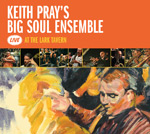
Track listing:
1. Elements
2. Walkin’ the Dog
3. Transconfiguration
4. Renee
5. The Other Funk
6.I Remember Roland
7. Yet to Come
8. The Gate (A Portarait of the Mohawk)
9. Change
Personnel:
Keith Pray- alto/soprano sax
Dave Fisk - alto sax
Brian Patneaude - tenor sax
Lee Russo - tenor sax
Scott Hall - bari sax
Scott Thompson - trumpet
Terry Gordon - trumpet
Sam Ponder - trumpet
Steve Lambert - trumpet
Dylan Canterbury - trumpet
Rick Rosoff - trombone
Ken Olsen - trombone
Brian Kaplan - trombone
Adam Streeter - tuba
Dave Gleason - piano
Lou Smaldone - bass
Bob Halek - drums
Yuko Kishimoto - piano (1)
Katie Pray - alto sax (3,4,7)
click here for audio samples or to purchase this CD
click here to learn more about Keith Pray's Big Soul Ensemble
|
|
KEITH PRAY’S BIG SOUL ENSEMBLE
Live at the Lark Tavern
by J Hunter
Keith Pray’s Big Soul Ensemble has not only survived in an economic morass that eats most bands – let alone 17-piece big bands – like chicken wings at a Super Bowl buffet; it has thrived, staging outstanding performances at A Place For Jazz and the Albany Riverfront Jazz Festival in addition to BSE’s monthly residency at Tess’ Lark Tavern in Albany. Now we get to hear the fruits of Pray’s labor on Live at the Lark Tavern, and at the end of the day, the fruit tastes pretty darn good.
A group the size of Big Soul isn’t going to “open small” and it doesn’t, kicking things off with a bubbling take on Yuko Kishimoto’s “Elements.” Trumpets and saxophones present the melody over a pumping vamp by the rest of the group, and then Pray steps out front and launches a burning alto sax solo. On many of the BSE shows I’ve seen, Pray was content to “play point guard” and set up his teammates for the solo spot; by taking the lead early here, he takes ownership of the piece and says, in effect, “This is my thing! I built it, I believe in it, and here it is!” Tenorman Brian Patneaude’s attention-getting follow-up kicks “Elements” into a gear reminiscent of Horace Silver’s “Senor Blues”, maintaining the tempo but giving the music a loping sense. Kishimoto adds to this by playing piano fills that stop just short of a counter. Steve Lambert’s duet with his fellow horn players brings “Elements” back to its original attack, putting the cap on a dynamic tune that begs the question, “If this is what they do on the first number, what’s the rest of the set going to be like?!”
In the past, Big Soul’s set list mixed Pray originals with interpretations of material by artists ranging from John Coltrane and Charles Mingus to Mike Patton’s avant-rock band Mr. Bungle. For Lark, Pray’s motto is “Think Global, Play Local”, choosing works from some of the area’s best composers: Along with “Elements”, Kishimoto contributes “Yet to Come”, a grooving piece with a killer arrangement and a high-flying Lee Russo tenor sax solo; John Dworkin’s “Renee” starts as a pensive meditation by BSE’s regular keyboardist Dave Gleason, and then turns into a fast waltz that retains a pastoral sense; and the big-band transformation of Patneaude’s “Change” is so successful, anyone unfamiliar with the original recording would never believe the tune started out in life as a quartet piece.
In a genre that can get way too serious for its own good, Big Soul never loses sight of the fun that can be had with jazz. “Walkin' the Dog” is nothing but fun, from the funky trade-offs between Gleason and bassist Lou Smalldone to the old-time big-band blues vibe Russo surfs as he serves up his usual mix of passion and precision. “The Other Funk” begins with a ponderous figure that seems uncompromisingly melancholy… until you realize it’s the signature lyric from Dire Straits’ “Money for Nothing.”
On the flip side, the quality of musicianship in Big Soul lets Pray attempt complex works like “Transconfiguration” (which evokes Nefertiti-era Miles Davis) and the three-movement orchestral travelogue “The Gate (A Portrait of the Mohawk).” While the latter tune re-creates the joy and the thrill of riding down one of this state’s best-known rivers, Bob Halek’s faint tom-toms acknowledge the bloodshed and loss that struck down the people who lived there before we did.
Technical issues do rear their ugly heads on Lark: The area-mic system Pray used for recording literally puts the horn section at the rear of the mix, which doesn’t help Lambert or Dylan Canterbury with their respective first solos; Canterbury also has a bit of a stumble during his solo on “Walkin'", though he does right himself eventually. By the end of Lark, though, both players are lighting it up just fine – Lambert on “Yet to Come”, Canterbury on “The Gate.” Apart from those minor issues, Live at the Lark Tavern is a fine document of a multi-faceted, multi-talented unit that started with a dream and has blossomed full flower.
J HUNTER is a former announcer/producer for radio stations in the Capital Region and the Bay Area, including KSJS/San Jose (where he was Assistant Music Director/Jazz Programming) and Q104 WQBK/Albany. He is a frequent contributor to the web site All About Jazz and to the monthly music magazine State of Mind. He currently resides in Clifton Park.
|

